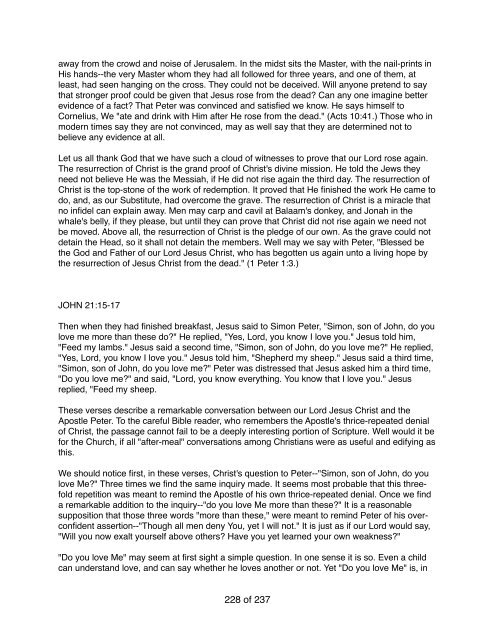J. C. Ryle John
John Charles Ryle (May 10, 1816 - June 10, 1900) was an evangelical Anglican clergyman and first Bishop of Liverpool. He was renowned for his powerful preaching and extensive tracts.
John Charles Ryle (May 10, 1816 - June 10, 1900) was an evangelical Anglican clergyman and first Bishop of Liverpool. He was renowned for his powerful preaching and extensive tracts.
Create successful ePaper yourself
Turn your PDF publications into a flip-book with our unique Google optimized e-Paper software.
away from the crowd and noise of Jerusalem. In the midst sits the Master, with the nail-prints in<br />
His hands--the very Master whom they had all followed for three years, and one of them, at<br />
least, had seen hanging on the cross. They could not be deceived. Will anyone pretend to say<br />
that stronger proof could be given that Jesus rose from the dead? Can any one imagine better<br />
evidence of a fact? That Peter was convinced and satisfied we know. He says himself to<br />
Cornelius, We "ate and drink with Him after He rose from the dead." (Acts 10:41.) Those who in<br />
modern times say they are not convinced, may as well say that they are determined not to<br />
believe any evidence at all.<br />
Let us all thank God that we have such a cloud of witnesses to prove that our Lord rose again.<br />
The resurrection of Christ is the grand proof of Christ's divine mission. He told the Jews they<br />
need not believe He was the Messiah, if He did not rise again the third day. The resurrection of<br />
Christ is the top-stone of the work of redemption. It proved that He finished the work He came to<br />
do, and, as our Substitute, had overcome the grave. The resurrection of Christ is a miracle that<br />
no infidel can explain away. Men may carp and cavil at Balaam's donkey, and Jonah in the<br />
whale's belly, if they please, but until they can prove that Christ did not rise again we need not<br />
be moved. Above all, the resurrection of Christ is the pledge of our own. As the grave could not<br />
detain the Head, so it shall not detain the members. Well may we say with Peter, "Blessed be<br />
the God and Father of our Lord Jesus Christ, who has begotten us again unto a living hope by<br />
the resurrection of Jesus Christ from the dead." (1 Peter 1:3.)<br />
JOHN 21:15-17<br />
Then when they had finished breakfast, Jesus said to Simon Peter, "Simon, son of <strong>John</strong>, do you<br />
love me more than these do?" He replied, "Yes, Lord, you know I love you." Jesus told him,<br />
"Feed my lambs." Jesus said a second time, "Simon, son of <strong>John</strong>, do you love me?" He replied,<br />
"Yes, Lord, you know I love you." Jesus told him, "Shepherd my sheep." Jesus said a third time,<br />
"Simon, son of <strong>John</strong>, do you love me?" Peter was distressed that Jesus asked him a third time,<br />
"Do you love me?" and said, "Lord, you know everything. You know that I love you." Jesus<br />
replied, "Feed my sheep.<br />
These verses describe a remarkable conversation between our Lord Jesus Christ and the<br />
Apostle Peter. To the careful Bible reader, who remembers the Apostle's thrice-repeated denial<br />
of Christ, the passage cannot fail to be a deeply interesting portion of Scripture. Well would it be<br />
for the Church, if all "after-meal" conversations among Christians were as useful and edifying as<br />
this.<br />
We should notice first, in these verses, Christ's question to Peter--"Simon, son of <strong>John</strong>, do you<br />
love Me?" Three times we find the same inquiry made. It seems most probable that this threefold<br />
repetition was meant to remind the Apostle of his own thrice-repeated denial. Once we find<br />
a remarkable addition to the inquiry--"do you love Me more than these?" It is a reasonable<br />
supposition that those three words "more than these," were meant to remind Peter of his overconfident<br />
assertion--"Though all men deny You, yet I will not." It is just as if our Lord would say,<br />
"Will you now exalt yourself above others? Have you yet learned your own weakness?"<br />
"Do you love Me" may seem at first sight a simple question. In one sense it is so. Even a child<br />
can understand love, and can say whether he loves another or not. Yet "Do you love Me" is, in<br />
228 of 237




